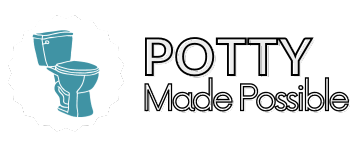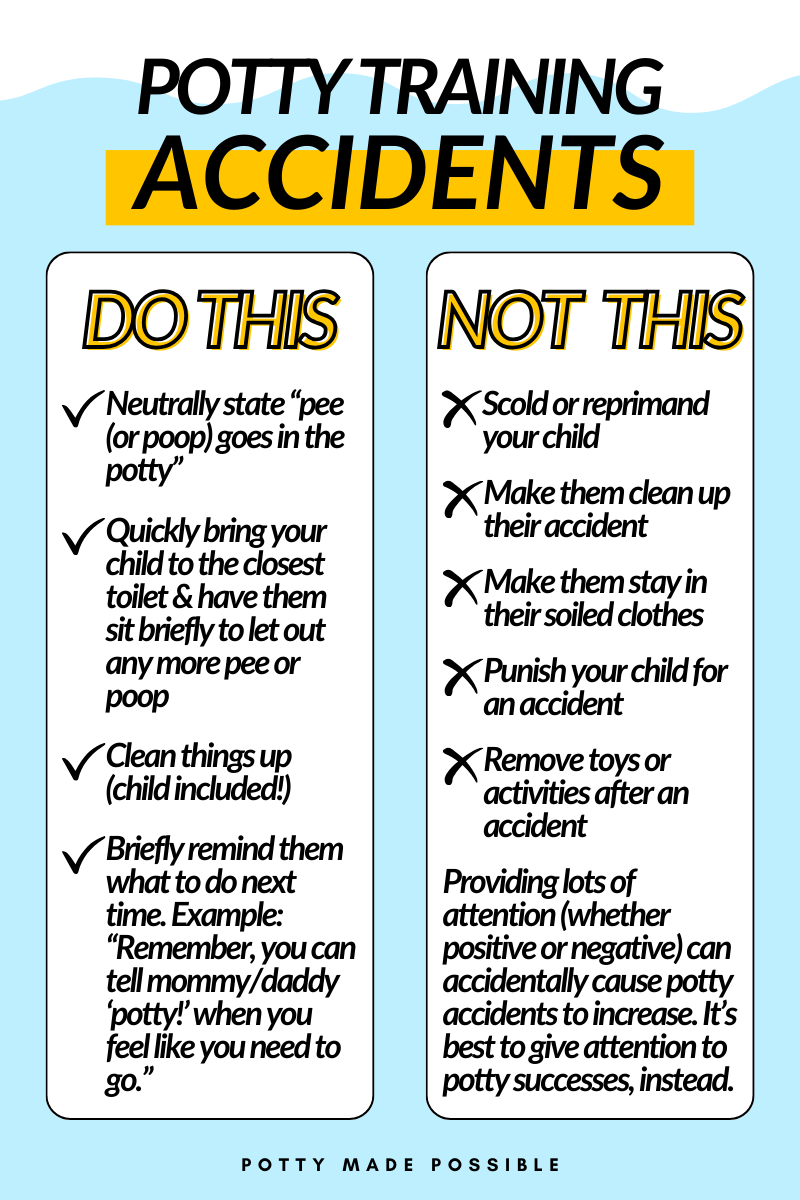How to Handle Potty Training Accidents
No matter what phase of potty training you’re in, you’re going to want to know how to handle potty training accidents!
When Do Potty Training Accidents Happen
While we can’t pinpoint the exact moment in time that you’re child is going to have a pee accident or poop accident during potty training, there are some things you can expect when it comes to potty accidents during potty training.
Should I expect potty training accidents on the first day of potty training?
The short answer - yes!
Accidents are to be expected, and often a part of the learning process.
Your child might start the first day of potty training without even being aware of the feeling of peeing.
With an effective approach to potty training, your child will learn to “feel the urge” to pee and poop and then make it to the potty. This takes practice!
During the first few days of potty training, while your little one is learning, they may miss the signal, and that’s okay! That’s where you come in to help them make the connection.
Is it normal for potty training accidents to happen after the first 3 days of potty training?
You can see a lot of progress during the first 3 days of potty training, however, the potty-training task doesn’t end there. This is a big new skill your child is learning!
After the first few days of potty training, your child should be learning to recognize their body signals. This will lead to more self-initiation, more pees and poops in the potty, and of course, less accidents!
Keep in mind: Self-initiation can look different for different kids. Also, your child may still need support with initiating after they (and you) notice that they have the sensation of needing to use the potty.
If your child is still having difficulty noticing the “urge” when they have to pee or poop and lots of accidents are happening or you find yourself frequently taking your child to the potty to avoid an accident, it may be time to consider an adjustment to your potty training approach.
It is a great sign if your child is peeing or pooping on the potty after 3 days of potty training, but they likely aren’t going to be 100% successful right away.
When can I expect potty training accidents to stop?
This can vary!
If you’ve set a solid foundation for potty training during the first week of potty training, your child is likely not going to have many accidents at home - although they may happen occasionally.
Your child will need to learn to use the potty at daycare or school amongst distractions, at the grocery store, park, and all the other exciting places they go. This can present a challenge and an increase in accidents. The best general plan is to stay as consistent as possible in different places so your child can master their potty skills while out and about.
As mentioned above, if your little one is having a hard time with potty training during the initial few days, a change in your approach may be beneficial to decrease potty accidents.
While potty training accidents can occur for several weeks following the start of potty training, if they are super frequent, it will likely be helpful to revisit and refocus on potty training.
How do I know if my child is going through a potty training regression?
Some potty-trained children may suddenly start having an increase in accidents.
This may be a regression with potty training if your child is never or rarely initiating when they have to pee or poop, mainly having accidents, and this is occurring for at least a week or two.
If your child was peeing and pooping in the potty pretty consistently and begins to have more frequent accidents, consider if there are any changes or situations that may be contributing to this shift.
Whether you can or can’t figure out why the potty regression is happening, it’s important to stay supportive of your child while you help them get back on track with using the potty.
What to do when a Potty Training Accident Happens
There are lots of things you can do to prepare yourself beforehand (think waterproof sheets and cleaning supplies) to make accidents less of a catastrophe. Check out some recommended potty training products here.
When potty accidents do occur, it's crucial to have a plan for responding to accidents.
We totally get that a sudden burst of pee can catch you off guard and might want to gasp or even shout - but instead, try to stay calm! The way you respond to your child in these moments can play a huge role in their potty training success.
Other common questions about potty accidents:
Should I use special potty training pants?
Potty training underpants (underwear with extra padding and protection) are often unnecessary and not recommended.
It’s true that training undies can help the adults avoid a potty accident mess, but they can confuse your child.
Training underwear can also make it more difficult for you to notice if your child is beginning to make a tinkle accident. The quicker you notice, the quicker you can help your child make it to the potty to avoid a mess, and most importantly, help them learn to pee and poop in the potty!
When ditching diapers or pull-ups for potty training, use regular undies after your child is having some success bottomless!
If your child’s daycare or school has strict requirements, you might consider using rubber/plastic underwear over their regular panties while they’re learning.
For unavoidable long car rides or a flight early on in potty training, rubber/plastic underwear can be used as a safety net, too. Keep in mind that there are lots of other ways to prepare for potty success in those situations - read more about travel + potty training here.
It feels like my child is having toileting accidents on purpose. What do I do?
If you feel like your child is having accidents on purpose, get curious. Take some notes on the situations to track when & where accidents are occurring and what’s happening after the accident (their response, your response, etc.).
Is your child uncomfortable?
Are they trying to get away from or avoid something?
Are they seeking attention (maybe they have a new baby brother or sister)?
It’s important to rule out medical causes (did you know constipation can make pee accidents more likely?)
It’s easy to get frustrated in these situations. Do your best to stay calm and help your child through this hiccup.
My child doesn’t notice or care when they have a potty accident. How do I handle this?
If your child continues to play happily and unphased with completely soiled pants, this likely means that they still need support with learning to recognize their body cues and act on them.
Give your child frequent reminders of the potty expectations during the day to keep it fresh in their mind. If you are using a reward, mention that with your reminder and, of course, reward any potty successes.
As long as your child is not struggling with withholding, throughout the day, bring attention to times they are keeping their bottoms dry. Say something like, “Wow your pants have been dry since breakfast, can you feel that? You’re doing a great job listening to your body.”
You can also occasionally ask your child to check themself to see if they are wet/dirty or dry/clean. If they are keeping their bottoms clean, provide some praise to help them feel proud!
At the end of the day, remember that potty training is a BIG skill for your child to learn!
Your child *WILL* learn to use the potty with your help along the way.


